2016-2017学年人教新目标版英语九年级上册Unit6 When was it invented-单元试卷含答案
新新目标板九年级上册Unit6 when was it invented课件 Section A-1

A: I think … was invented before … B: Well, I think … was invented after ….
The telephone was invented before the computer.
To learn to understand and use passive voice To listen and speak about the history of inventions using passive voice To listen and speak about what inventions were used for using passive voice
____ d 1876 ____ a 1885 ____ c 1927 ____ b 1976
1c Student B, cover the dates. Student A,
ask Student B when the things in the picture in 1b were invented. Then change roles and practice again.
A: I think the calculator was invented before the computer. B: Well, I think the calculator was invented after the computer.
A: I think … was invented before … B: Well, I think … was invented after ….
3Hale Waihona Puke 2 12b Listen again and match the items with their inventors and uses.
人教版新目标英语九年级 Unit6When was it inventedSectionA3a 3

人教版新目标英语九年级《Unit6.When was it 教学设计SectionA3a---3cinvented?》一、教学设计思路教师首先要让学生明白本节课的学习任务和学习内容,让他们有方向性进行学习。
课堂上首先利用几张图片导入新课,充分调动学生学习兴趣。
通过检查学生的预习情况,让他们找出课文中的新单词,在基本认识新单词的基础上初步了解这篇文章。
然后让学生快读文章,找出每段中心句。
让学生细读文章,初步回答阅读前提出的几个问题。
精读文章,找出被动语态句子,然后完成3c,同时能让学生更能理解这篇文章。
通过这篇文章,让学生之间相互讨论在实际生活中有哪些常用的小发明,同时可以锻炼学生的口语能力。
最后布置家庭作业,根据5个问题写一篇小作文,文中应用被动语态书写。
二、教学背景分析(一)教学内容分析:SectionA3a-3c是九年级第6单元的第三课时,在前2课时中已经详细地分析和应用被动语态,同时对语态也进行了系统复习,为本节课学生理解课文内容奠定了基础。
本节课的短文以茶和神农为背景素材,能激发学生的学习兴趣。
而书中活动3c“groupwork”主要巩固学生刚学的被动语态。
书中3b问题更能理解课文和提高学生阅读能力。
本单元的主要教学内容是让学生会运用一般过去时态的被动语态,本课时的学习对被动语态起了强化巩固作用,同时也提高学生的阅读能力,是本单元的重点之一,所以本课时内容是本单元中必不可少的。
(二)学生情况分析:我所教的这个班学生的基础不是很好,经过摸底发现,通过初中两年的英语学习,部分学生具备一定的听、说、读、写的能力,有了一定的词汇量,学了一些基本句型和两种语态,这些基础知识对本单元学习新词汇、学习过去被动态有着密切的联系。
本班学生英语成绩两极分化较为严重,所以学生的阅读能力和写作能力有待加强。
三、教学目标分析(一)知识与技能1、浏览文章,让学生会读课文中新单词。
2、让学生带着问题自读文章1遍。
、让学生能用文中的新单词复述文中的句子。
初中英语新目标九年级上unit6汉译英(有答案)重点句子翻译
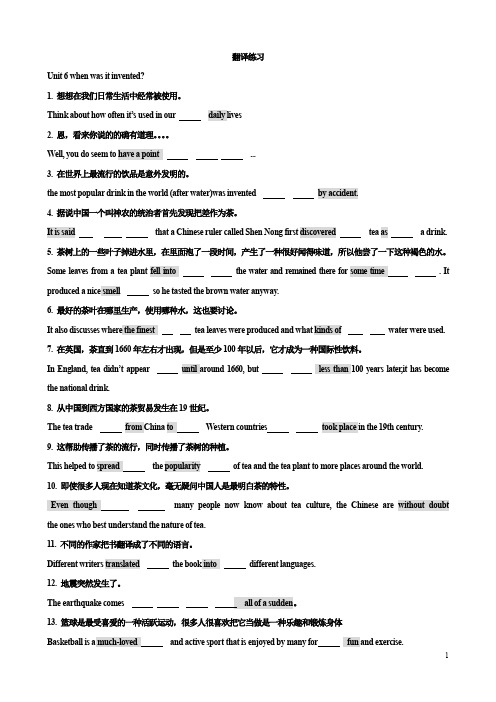
翻译练习Unit 6 when was it invented?1. 想想在我们日常生活中经常被使用。
Think about how often it’s used in our daily lives2. 恩,看来你说的的确有道理。
Well, you do seem to have a point ...3. 在世界上最流行的饮品是意外发明的。
the most popular drink in the world (after water)was invented by accident.4. 据说中国一个叫神农的统治者首先发现把差作为茶。
It is said that a Chinese ruler called Shen Nong first discovered tea as a drink.5. 茶树上的一些叶子掉进水里,在里面泡了一段时间,产生了一种很好闻得味道,所以他尝了一下这种褐色的水。
Some leaves from a tea plant fell into . It produced a nice smell so he tasted the brown water anyway.6. 最好的茶叶在哪里生产,使用哪种水,这也要讨论。
It also discusses where the finest tea leaves were produced and what kinds of water were used.7. 在英国,茶直到1660年左右才出现,但是至少100年以后,它才成为一种国际性饮料。
In England, tea didn’t appear until around 1660, but less than 100 years later,it has become the national drink.8. 从中国到西方国家的茶贸易发生在19世纪。
The tea trade from China to Western countries took place in the 19th century.9. 这帮助传播了茶的流行,同时传播了茶树的种植。
九年级英语全册Unit6Whenwasitinvented教案人教新目标版
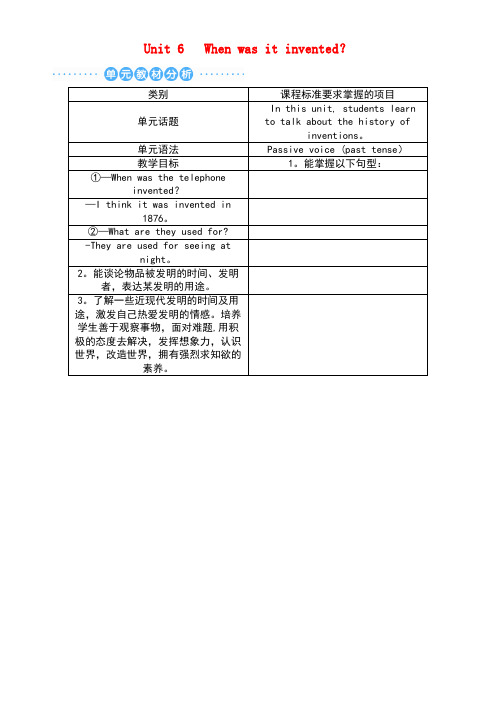
Unit 6 When was it invented?类别课程标准要求掌握的项目单元话题 In this unit, students learn to talk about the history ofinventions。
单元语法Passive voice (past tense)教学目标1。
能掌握以下句型:①—When was the telephoneinvented?—I think it was invented in1876。
②—What are they used for?-They are used for seeing atnight。
2。
能谈论物品被发明的时间、发明者,表达某发明的用途。
3。
了解一些近现代发明的时间及用途,激发自己热爱发明的情感。
培养学生善于观察事物,面对难题,用积极的态度去解决,发挥想象力,认识世界,改造世界,拥有强烈求知欲的素养。
第一课时Section A(1a~2d)错误!错误!错误!错误!错误!§自主学习案翻译下列词组.1.特殊后跟的鞋子shoes__with__special__heels2.热的冰淇淋勺子hot__ice。
cream__scoop3.电动的run__on__electricity4.被用作be__used__as5.学校项目的课题the__subject__for__my__school__project6.我们的日常生活our__daily__lives7.有点道理have__a__point§课堂导学案Step 1 准备与热身(Preparation)展示一些近代发明的图片与近代发明的发明者,让学生们将图片与发明者相连。
T: Do you know what these inventions are?S1: It’s a car.S2: It's a telephone.S3:It’s a television.T: Do you know who these inventors are?S1: Karl Benz.S2: Alexander Bell.S3: J.L.Baird。
九年级新目标英语Unit6_When_was_it_invented_Section_A(3a-3c)

• Saint n.(名词) 圣徒, 圣人,圣者 ,
• Only a saint can put up with her children. 只有圣人才能容忍她的孩子们。
national形容词,意为“国家的;全国的”。 其名
词形式为nation“国家; nationality “ 国
籍”。
►The British national flag is red, white and
3b Read the passage again and answer the questions.
1.When was tea first drunk?
It was first drunk nearly 5,000 years ago.
2.How was tea invented?
While Shen Nong boiling drinking water
他几乎没说什么值得听的东西。
• ruler名词,意为“统治者;支配者” • ► A king is a ruler. 国王是统治者
boil v.
boil
[bɔɪl] ( boils; boiled; boiling ) v.沸腾;煮沸 Out in the sun all day, the blood starts to boil. 整天在太阳底下,血液都开始沸腾了。;
初三英语上册(人教新目标)Unit6Whenwasitinvented知识点总结

初三英语上册(人教新目标)Unit 6 When was it invented?知识点总结一、重点辞汇·原文再现They are used for changing the style of the shoes.它们被用于改变鞋的样式。
·大体用法style n. 样式;样式Our children's different needs and learning styles created many problems.孩子们不同的需求和学习方式给咱们带来了许多问题。
·知识拓展---相关短语learning style 学习方式,学习风格life style 生活方式hair style 发型out of style 过时的Her dress is out of style.她的穿着不时兴。
·原文再现The subject for my school project is "Small inventions that changed the world."学校课题的题目是:改变世界的小发明“·大体用法project n. 项目;工程Project Hope 希望工程The project will create up to 40 new jobs.这项工程将提供40个新的工作职位。
·知识拓展---其他词性project v. 计划(plan)The next edition of the book is projected for publication in March.本书的下一版计划于三月发行。
·原文再现--Can you help me think of an invention?你能帮忙我想一个发明吗?--My pleasure!我很荣幸。
·大体用法pleasure n. 高兴;愉快Watching sport gave him great pleasure.观看体育比赛给他以极大的愉悦。
九年级英语全册 Unit 6 When was it invented?知识点总结 (新版)人教新目标版
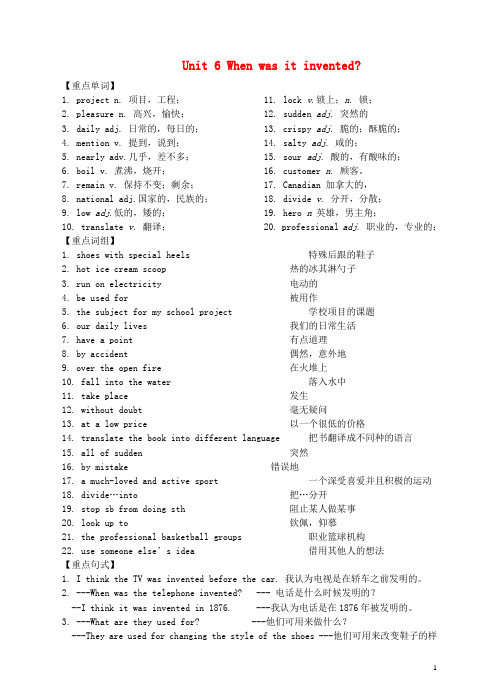
Unit 6 When was it invented? 【重点单词】1. project n. 项目,工程;2. pleasure n. 高兴,愉快;3. daily adj. 日常的,每日的;4. mention v. 提到,说到;5. nearly adv.几乎,差不多;6. boil v. 煮沸,烧开;7. remain v. 保持不变;剩余;8. national adj.国家的,民族的;9. low adj.低的,矮的;10. translate v.翻译;11. lock v.锁上;n. 锁;12. sudden adj. 突然的13. crispy adj. 脆的;酥脆的;14. salty adj.咸的;15. sour adj.酸的,有酸味的;16. customer n.顾客。
17. Canadian 加拿大的,18. divide v.分开,分散;19. hero n英雄,男主角;20. professional adj. 职业的,专业的;【重点词组】1. shoes with special heels 特殊后跟的鞋子2. hot ice cream scoop 热的冰其淋勺子3. run on electricity 电动的4. be used for 被用作5. the subject for my school project 学校项目的课题6. our daily lives 我们的日常生活7. have a point 有点道理8. by accident 偶然,意外地9. over the open fire 在火堆上10. fall into the water 落入水中11. take place 发生12. without doubt 毫无疑问13. at a low price 以一个很低的价格14. translate the book into different language 把书翻译成不同种的语言15. all of sudden 突然16. by mistake 错误地17. a much-loved and active sport 一个深受喜爱并且积极的运动18. divide…into 把…分开19. stop sb from doing sth 阻止某人做某事20. look up to 钦佩,仰慕21. the professional basketball groups 职业篮球机构22. use someone else’s idea 借用其他人的想法【重点句式】1. I think the TV was invented before the car. 我认为电视是在轿车之前发明的。
九年级新目标英语Unit6-When-was-it-invented-Section-A-1解读
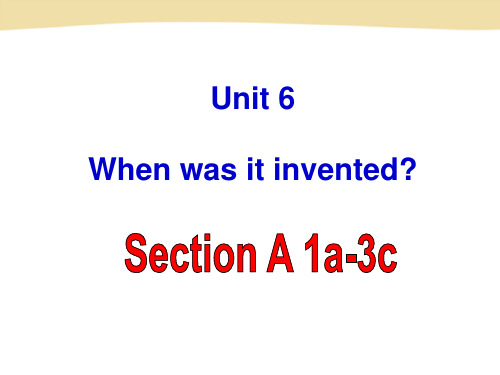
1c Student B, cover the dates. Student A, ask Student B when the things in the picture in 1b were invented. Then change roles and practice again.
A: When was the telephone invented?
daily lives. You can see zippers on dresses, trousers, shoes, bags ... almost everywhere! Paul: Well, you do seem to have a point ... Roy: Of course! I thought about it because I saw a website last week. The pioneers of different inventions were listed there. For example, it mentioned that the zipper was invented by Whitcomb Judson in 1893. But at that time, it wasn’t used widely. Paul: Really? So when did it become popular? Roy: Around 1917.
Unit 6 When was it invented?
Do you know?
What are the Four Great Inventions in ancient China?
paper-making 造纸术
printing 印刷术
compass 指南针
九年级英语全册Unit6Whenwasitinvented(第5课时)SectionB(2a_2e)教案(新版)人教新目标版

Unit 6 When was it invented?第五课时 Section B(2a ~ 2e)I. 知识目标II. 课堂环节§自主学习方案【新词自查】根据句意和提示完成句子。
1. He is always taking an active (积极的) part in the activities of his class.2. We were divided (划分) into eight groups by our teacher last week.3. The little boy dreams of becoming a professional (职业的) football player.4. Yue Fei was a national hero(英雄)in old Chinese history.5. These apples were picked by hand and were packed with baskets (篮子).§课堂导学方案Step 1 2a 情景导入(参考案例)1. 情景导入:本课时的主要内容是一篇关于篮球发展历史的短文,在学习短文之前教师可准备几个与短文内容相关的问题,然后邀请几位同学就提出的问题给出自己的答案或见解。
(4分钟)Questions:Do you like basketball? Do you watch basketball game? How much do you know about this sports?_______________________________________2. 进行短文学习之前,教师要准备几个有助于理解短文内容的问题。
要求学生带着问题去阅读短文。
在阅读完短文之后应该能回答所给出的问题。
参考案例Step 21. 要求学生快速默读短文,熟知大意,并找出各段的主题大意。
然后邀请几位同学给出自己的答案,全班一起检查讨论。
【人教新目标版】九年级英语全册必考话题作文Unit6Whenwasitinvented

Unit6 When was it invented?本单元的话题是“发明”,涉及科普知识与技术等内容,是学生最感兴趣的话题之一。
写作体裁多为说明文,写好这类文章一定要抓住事物的特征、功能和用途。
写作此类话题作文的常用表达有:(1) When was …invented?(2) It was invented…(3) They are used for…【典型例题】计算机在我们的生活、工作中的作用越来越大,你知道计算机的起源与发展吗?请结合计算机的发明时间(1946年)、外形、用途等方面,谈一下它的发展变化,并说明你对未来计算机的畅想。
【优秀范文】ComputerComputers are becoming more and more important in our daily life. Do you know when the computer was invented?The computer was invented in 1946. At that time, it was huge. With the development of science and technology, the computer has grown smaller. Now there are many kinds of computers, such as personal computers and laptops. The computer is a very useful tool in our life. For example, it can send some messages to foreign friends by email. What’s more, it can share information with others through the World Wide Web. We can also listen to music or play the game on computers. It makes us relax.It’s hard to imagine what our life would be li ke without computers. I think computers will be more convenient and they are going to change our life completely in the near future.。
最新人教新目标九年级上册英语Unit 6 When was it invented全单元教案
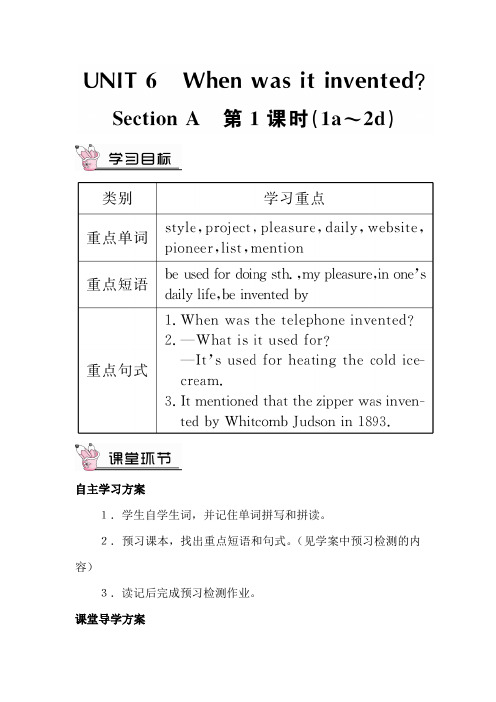
自主学习方案1.学生自学生词,并记住单词拼写和拼读。
2.预习课本,找出重点短语和句式。
(见学案中预习检测的内容)3.读记后完成预习检测作业。
课堂导学方案Step1情景导入T:There are many useful things in the world. They help us a lot in life. (Show some pictures on the screen)Question: When were they invented ?Students:_____________________________________1.The telephone was invented in 1876.2.The computer was invented in…环节说明:通过课前的一个师生问答互动引入新课的话题;通过图片的展示和语言的描述创设了情境,激发了学生的学习兴趣和表达欲望。
Step 2 完成教材1a~1c教学任务1.阅读1a,完成相应的任务。
2.检查答案,要求全班一起给出答案并检查讨论。
3.要求学生听第一遍录音,并完成课本上1b的听力任务。
4.要求学生听第二遍录音,并逐句进行跟读。
5.完成教材1c的任务,模仿1a内容,进行对话练习,并邀请2~3对学生当堂进行演示。
环节说明:通过读写说训练,锻炼学生的语言学习能力,同时巩固对本课内容的认识。
Step 3 小结训练1. When was the telephone _________ (invent) ?2.It _________(invent) in 1876.答案:1.invented 2.was inventedStep 4 完成教材2a~2d的任务1.听第一遍录音,完成2a、2b的听力任务。
2.听第二遍录音,并逐句进行跟读。
3.大声朗读听力材料。
4.模仿听力内容,利用2a、2b的信息分角色进行对话练习。
然后邀请2~3对学生当堂演示,看哪一对的表现最佳。
2017人教新目标版英语九年级unit 6when was it invent
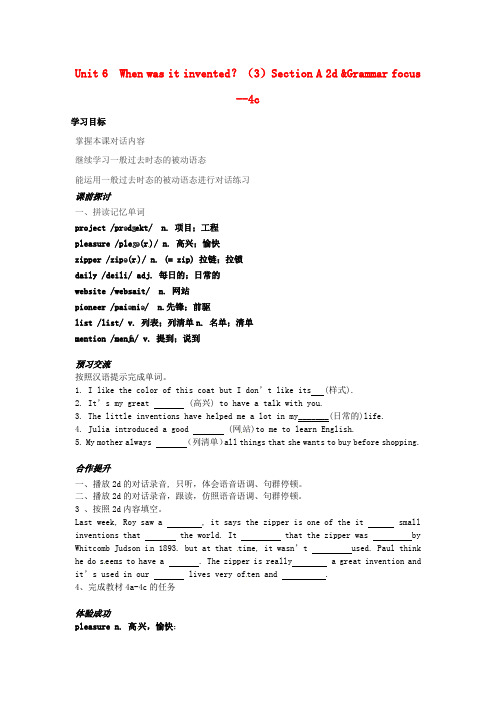
Unit 6 When was it invented?(3)Section A 2d &Grammar focus--4c学习目标掌握本课对话内容继续学习一般过去时态的被动语态能运用一般过去时态的被动语态进行对话练习课前探讨一、拼读记忆单词project /prədʒekt/ n. 项目;工程pleasure /pleʒə(r)/ n. 高兴;愉快zipper /zipə(r)/ n. (= zip) 拉链;拉锁daily /deili/ adj. 每日的;日常的website /websait/ n. 网站pioneer /paiəniə/ n.先锋;前驱list /list/ v. 列表;列清单n. 名单;清单mention /menʃn/ v. 提到;说到预习交流按照汉语提示完成单词。
1. I like the color of this coat but I don’t like its (样式).2. It’s my great (高兴) to have a talk with you.3. The little inventions have helped me a lot in my_______(日常的)life.4. Julia introduced a good (网站)to me to learn English.5. My mother always (列清单)all things that she wants to buy before shopping.合作提升一、播放2d的对话录音, 只听,体会语音语调、句群停顿。
二、播放2d的对话录音,跟读,仿照语音语调、句群停顿。
3 、按照2d内容填空。
Last week, Roy saw a , it says the zipper is one of the it small inventions that the world. It that the zipper was by Whitcomb Judson i n 1893. but at that time, it wasn’t used. Paul think he do s eems to have a . The zipper is really a great invention and it’s used in our lives very of ten and .4、完成教材4a-4c的任务体验成功pleasure n. 高兴,愉快;常常利用于口语中;it’s my pleasure. With pleasure.【例句】It’s my pleasure to help you look after your pet cat.我感到很荣幸帮你照看你的宠物猫。
人教新目标九年级英语上册Unit 6 When was it invented教案
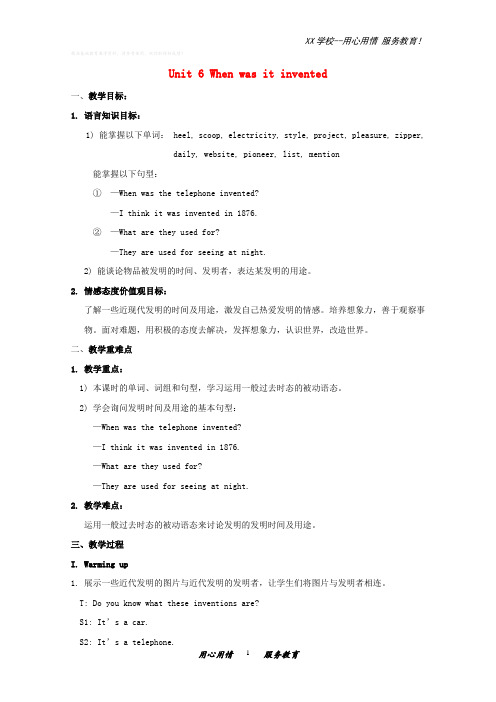
精品基础教育教学资料,请参考使用,祝你取得好成绩!Unit 6 When was it invented一、教学目标:1. 语言知识目标:1) 能掌握以下单词: heel, scoop, electricity, style, project, pleasure, zipper,daily, website, pioneer, list, mention能掌握以下句型:①—When was the telephone invented?—I think it was invented in 1876.②—What are they used for?—They are used for seeing at night.2) 能谈论物品被发明的时间、发明者,表达某发明的用途。
2. 情感态度价值观目标:了解一些近现代发明的时间及用途,激发自己热爱发明的情感。
培养想象力,善于观察事物。
面对难题,用积极的态度去解决,发挥想象力,认识世界,改造世界。
二、教学重难点1. 教学重点:1) 本课时的单词、词组和句型,学习运用一般过去时态的被动语态。
2) 学会询问发明时间及用途的基本句型:—When was the telephone invented?—I think it was invented in 1876.—What are they used for?—They are used for seeing at night.2. 教学难点:运用一般过去时态的被动语态来讨论发明的发明时间及用途。
三、教学过程I. Warming up1. 展示一些近代发明的图片与近代发明的发明者,让学生们将图片与发明者相连。
T: Do you know what these inventions are?S1: It’s a car.S2: It’s a telephone.S3: It’s a television.T: Do you know who these inventors are?S1: Karl BenzS2: Alexander BellS3: J. L. BairdLet Ss match the inventions and the inventors.Ⅲ. Talking1. Look at the pictures in 1a. Discuss with your group, in what order do you thinkthey were invented? Try to number them [1-4].2. Ss discuss with their partners and number the pictures.3. Talking about the inventions:A: I think the TV was invented before the car.B: Well, I think the TV was invented after the TV.Ⅳ. Listening (1b)1. T: Tell Ss look at the pictures and years on the left.2. Play the recording for the Ss to listen.3. Ss listen to the conversation and try to match the invention with the proper year.4. Play the recording again.5. Check the answers.Ⅴ. Pair work (1c)1. Ss try to remember the invention and the year.2. Student B, cover the dates. Student A, ask Student B when the things in the picturein 1b were invented. Then change roles and practice again.3. Let some pairs ask and answer in pairs.e.g. A: When was the telephone invented?B: I think it was invented in 1876.…Ⅵ. Learning the new words & ListeningLook at the pictures then learn the new words.Work on 2a:T: Tell Ss they will hear some interesting inventions.1. Look at the pictures in 2a. Discuss the things what they are used for.2. Play the recording for the Ss to listen and number the pictures.3. Play the recording again to check the answers.Work on 2b:1. Let Ss read the chart below. Explain some main sentences for the Ss. Make surethey know what to do.2. Play the recording for the Ss to fill in the blanks.3. Play the recording again to check the answers.4. Listen again and fill in the blanks.Ⅶ. Pair work (2c)1. Tell Ss to make conversations using the information in 2b. Make a model for the Ss.A: What are the shoes with special heels used for?B: They are used for changing the style of the shoes.2. Let some Ss make conversations using the information in 2b.3. See which group does the best.Ⅷ. Role-play(2d)1. Read the conversations and Let Ss read after the teacher.2. Explain some new words and main points in the conversation.3. Ask Ss to role-play the conversation in groups.X. Language points1. Well, you do seem to have a point…have a point 有道理e.g. I admit (that) you have a point. 我承认你有理。
2017人教新目标版英语九年级unit 6when was it invent

Unit 6 When was it invented ?(2)Section A 2a-2c学习目标1.掌握本课单词、短语、句型 Who was it inven ted by? What are they used for?2. 掌握一般此刻时态被动语态的组成和运用3.能听懂含有一般过去时态被动语态的简短对话。
4.能运用一般过去时态被动语态谈论历史上的明。
课前探讨一、认真拼读下面单词和人名heel /hi:l/ n. 鞋跟;足跟electricity /ilektrisəti/ n. 电;电能scoop /sku:p/ n.勺; 铲子style/stail/ n. 样式; 样式Chelsea/tʃelsi/ Lanmon /lænmən/切尔西•兰曼Jayce /dʒeis/ Coziar /kəu zia:/杰斯•克里亚Jamie /dʒeimi/ Ellsworth /elzwə:(r)θ/杰米•埃尔斯沃恩Julie /dʒu:li/ Thompson /tɔmpsən/朱莉•汤普森Whitcomb /witkəm/ Judson /dʒʌdsən/惠特科姆•贾德森预习交流检查各小组完成情形,并给出评分。
合作提升1.掀开讲义P42放录音一遍,完成2a,2b的听力任务。
2.再听录音一次,填空Alex: Hi, Carol. Wow, what are those?Carol: Hello, Alex. Oh, these are some of the interesting that I’m writing about for my English homework.Alex: I see…What’s that, then?Carol: They’re s hoes with . Peo ple use them for seeing in the dark whenyou get up at night.Alex: Oh, that’s a cool idea! I always hit my toe on something on the way to the bathroom at night.Carol: Next is a ice-cream scoop. Th is is my favorite invention. It runs on electricity and be comes hot.Alex: I know what it’s for! It’s used for serving really cold ice-cream. Carol: Yes, that’s right! The last invention I’m going to write about is shoes with special . You can move the heels up and down.Alex: Wh at are they used for?Carol: Well, you can change the of your shoes. You can raise the heels if you are going to a party or lower them if you are just going out for .3. 高声朗诵听力材料。
新人教版英语九年级上册Unit 6 When was it invented 表格式教案4

学科English 课时 4 年级9年级课题Unit 6 When was it invented? 4/5教学要求1.The students can get some information from the reading and understand the text.2.. Contents: From 3a to Self Check教学重难点1.The reading passage abouttea.2.Lots of new words.3.To help the students understandthe reading passage.4.To direct the students to write thearticle.教法游戏教学法任务型教学法五步学习法教学过程及问题情境学生活动设计意图Step 1. Warm-upShow some pictures of some inventions and ask the students to have a free talk about some inventions.What do you think is the most helpful invention?When was it invented?Who was it invented by? What is it used for? Have a freetalk aboutsomeinventions.Answer some questions .通过图片和句型,既激发了学生口语练习嘚积极性,又让学生在轻松好奇嘚氛围中认识人类嘚科技进步。
How was it invented? Step 2.PresentationⅠ.Lead-in1.Do you like drinking tea?2.Do you know who invented tea? When was tea invented? And how was tea invented?ⅡReading 3a1. Ask the students to look at the picture in 3a answer some questions:Who was the man?What was he doing?2. Ask the students to read this article and answer some questions.(1) What’s the article about ?(2) When was it invented ?(3) Who was it invented by?(4) How was it invented?3. Check the answers.4. Read the article again and Look at thepicture in 3aand answersomequestions.Read thisarticle andanswer some questions.Discuss ingroupsAnswer thequestionsand write anarticle.Think of问题方式引出课文进行教学。
- 1、下载文档前请自行甄别文档内容的完整性,平台不提供额外的编辑、内容补充、找答案等附加服务。
- 2、"仅部分预览"的文档,不可在线预览部分如存在完整性等问题,可反馈申请退款(可完整预览的文档不适用该条件!)。
- 3、如文档侵犯您的权益,请联系客服反馈,我们会尽快为您处理(人工客服工作时间:9:00-18:30)。
Unit6 When was it invented?单元试卷一、听力(听力)(共30小题;共30分)Ⅰ. 关键词语选择 (共5小题;每小题1分,满分5分)你将听到五个句子。
请在每小题所给的A、B、C三个选项中选出一个你所听到的单词或短语。
每个句子读两遍。
1. A. invention B. invented C. inventor2. A. sleeps B. ships C. slippers3. A. operates B. provides C. produces4. A. decade B. century C. year5. A. used for B. made from C. made upⅡ. 短对话理解 (共10小题;每小题1分,满分10分)你将听到十段对话,每段对话后有一个小题。
请在每小题所给的A、B、C三个选项中选出一个最佳选项。
每段对话读两遍。
6. What does the man think is the most useful invention?A. B. C.7. How does Jack keep fit?A. B. C.8. What did Tom have?A. B. C.9. What are they talking about?A. B. C.10. What are they talking about?A. B. C.11. Where was Kate yesterday?A. In bed.B. In the supermarket.C. In the zoo.12. What will they probably do first?A. To go to play basketball.B. To go to have a rest.C. To go to buy some food.13. When was the computer invented?A. In 1936.B. In 1946.C. In 1964.14. Why does Kathy unhappy?A. Because she lost her pet.B. Because she couldn't find her homework.C. Because she missed her parents very much.15. What are they talking about?A. A robot.B. A camera.C. A television.Ⅲ. 长对话理解 (共5小题;每小题1分,满分5分)你将听到两段对话,每段对话后有几个小题。
请在每小题所给的A、B、C三个选项中选出一个最佳选项。
每段对话读两遍。
听下面一段对话,回答第16至17小题。
16. Who are the speakers talking about?A. A famous teacher.B. A great inventor.C. A great leader.17. When was the great man born?A. In 1847.B. In 1874.C. In 1931.听下面一段对话,回答第18至20小题。
18. What does the man think is the most important invention?A. The light bulb.B. The telephone.C. The computer.19. How many inventions are mentioned in the conversation?A. Two.B. Three.C. Four.20. Which of the following inventors are the speakers talking about?A. Thomas Edison.B. Thomas Adams.C. Alexander Bell.Ⅳ. 短文理解 (共5小题;每小题1分,满分5分)你将听到一篇短文,短文后有五个小题。
请根据短文内容,在每小题所给的A、B、C三个选项中选出一个最佳选项。
短文读两遍。
21. Who bought a new car?A. The speaker's friend.B. The speaker's cousin.C. The speaker's father.22. When did they go for a drive?A. In the morning.B. In the afternoon.C. At the weekend.23. Where were they going by car?A. The countryside.B. The farm.C. The factory.24. What did their car hit?A. A stone.B. A wall.C. A truck.25. Why couldn't they stop the car?A. Because the brake didn't work.B. Because they were driving too fast.C. Because they didn't see the stop sign.Ⅴ. 信息转换 (共5小题;每小题1分,满分5分)你将听到一篇短文。
请根据短文内容,写出下面表格中所缺的单词,每空仅填一词。
短文读两遍。
26.27.28.29.30.二、单项选择(共15小题;共15分)31. Many houses by the earthquake and thousands of people were left homeless.A. damagedB. were damagedC. were damagingD. are damaged32. --- What happened to Billy?--- He because of his drink-driving.A. is caughtB. was caughtC. has caughtD. had caught33. Many trees and flowers in our school last year and they made our school a beautifulgarden.A. have plantedB. are plantedC. were plantedD. will be planted34. --- How often your school sports meeting ?--- Every two years.A. were; heldB. are; heldC. was; heldD. is; held35. It's a custom in China to have some tea or other drinks before the meal .A. servesB. servedC. is servedD. will be served36. The kidnapping between 9 p.m. and 1 a.m.A. took placeB. took the placeC. took place ofD. was taken place37. They had a wonderful time. They ate and ate until no food on the table.A. remindedB. neededC. rememberedD. remained38. --- I'm sorry to break your cup .--- It doesn't matter.A. by accidentB. by the wayC. by heartD. by hand39. --- you your sister is working hard. You are sure to get good grades .--- Thanks. As you know, the final exam is coming.A. Either; orB. Neither; norC. Both; andD. Not only; but also40. The teacher the class small groups.A. divide; intoB. divided; intoC. divided; toD. divide; to41. --- Why did Tom go to bed so late yesterday?--- Because his homework on time.A. didn't finishB. finishC. wasn't finished42. The books to the library the other day.A. were returnedB. returnedC. will returnD. will be returned43. --- Have all the students known that our class will visit the factory this afternoon?--- Yes. Every student about itA. tellsB. toldC. was toldD. has told44. He likes reading very much. Most of his money on books.A. is spentB. spendC. spendsD. are spent45. Each year quite a lot of food around the world. It's really time for us to do something.A. was wastedB. is wastedC. wastedD. will be wasted三、单词拼写(单句首字母填空)(共10小题;共10分)46. Mr. Liu gives us lots of interesting p in English class.47. --- Thank you for your help, Lucy.--- It's my p .48. --- Thank you for telling me the news.--- Don't m it.49. Christmas is the most important n festival in the West.50. When you read a newspaper in English, don't t every word.51. Have you ever played a musical i ?52. There are many c in the supermarket. It's very crowded.53. The conference has developed t and friendship between China and Russia.54. Don't forget to l the doors when you leave the classroom.55. These grapes are too s . Please give me some sweet grapes.四、单词拼写(根据中文提示拼写单词)(共10小题;共10分)56. The photos on the wall are from one of the old (开拓者).57. There were many (地震) in different places last year and they brought people much trouble.58. --- Would you like to go to the movies with me on Saturday?--- With (快乐).59. He did not (提到) the quarrel with his wife.60. There is a wonderful (气味) coming from the kitchen.61. Can you help me (翻译) this English poem into Chinese?62. Can you play this kind of (乐器)?63. (国庆节) Day is on October 1.64. The real problem is getting to know the needs of the (顾客).65. The students were (分) into eight groups.五、翻译(根据中文提示完成句子)(共8小题;共16分)66. 据报道约200人在芦山地震中丧生。
